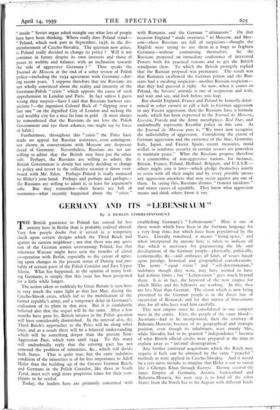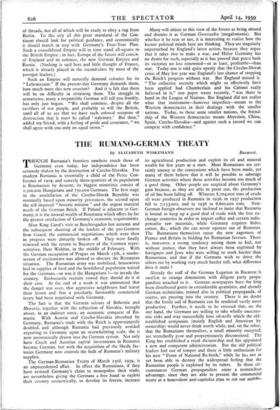GERMANY AND ITS " LEBENSRAUM "
By A BERLIN CORRESPONDENT
THE British guarantee to Poland has caused far less anxiety here in Berlin than is probably realised abroad. Very few people doubt that it served as a temporary check upon certain designs which the Third Reich had against its eastern neighbour ; not that there was any ques- tion of the German armies overrunning Poland, but that otherwise Warsaw might have seen the benefits of closer co-operation with Berlin, especially to the extent of agree- ing upon changes in the present status of Danzig and pro- bably of certain parts of the Polish Corridor and East Upper Silesia. What has happened, in the opinion of many lead- ing Germans, is simply that this issue has been postponed for a little while longer.
The action taken so suddenly by Great Britain is seen here in very much the same light as that last May, during the Czecho-Slovak crisis, which led to the mobilisation of the former republic's army, and a temporary delay in Germany's realisation of its plans in that area. But it is confidently believed also that the sequel will be the same. After a few months have gone by, British interest in the Polish question will have considerably diminished. In the interval also, the Third Reich's approaches to the Poles will be along other lines, and as a result there will be a bilateral understanding which will be something deeper than the present Non- Aggression Pact, which runs until 1944. To this many will undoubtedly reply that the existing pact has not removed the problem of minorities, &c., which still divide both States. That is quite true, but the same indefinite condition of the minorities is of far less importance to Adolf Hitler than the building up of the Greater German Reich, and Germans in the Polish Corridor, like those in South Tyrol, must wait until' more propitious times for their com- plaints to be settled.
Today, the leaders here are primarily concerned with establishing Germany's " Lebensraum." Here is one of those words which have been in the German language for a very long time, but which have been popularised by the Nazis. Literally translated, it means " living-space," and when interpreted by anyone here is taken to indicate all that which is necessary for guaranteeing the life and development of the German people—physically, politically, economically, &c.—and embraces all kinds of issues based upon prestige, historical and geographical considerations. The terms " equal status " and " self-determination," indefinite though they were, may have seemed to have had definite limits ; but " Lebensraum " goes much beyond them. It is in fact, the keyword of the new empire for which Hitler and his followers arc working. In this, they are less Nazi than German. The vision which is now being presented to the German people is in the direct line of succession of Bismarck, and for that matter of Stresemann also, for all who have read him carefully.
This new empire must be consolidated in one compact mass in the centre. First, the people of the same blood- Austrians—had to be incorporated, then the territory of Bohemia-Moravia, because of its geographical and strategic position, even though its inhabitants were mainly Slav, while Slovakia had to be granted " independence " because of what British official circles were prepared at the time to explain away as " internal disintegration."
Any further territorial acquisitions which the Reich may require it feels can be obtained by the same " peaceful " methods as were applied in Czecho-Slovakia. And it would be a very naive mistake to imagine that Hitler is out to sweep like a Ghengis Khan through Europe. Having secured the inner Empire of Germany, Austria, Sudetenland and Bohemia-Moravia, his next step is to bind all the other States from the North Sea to the Aegean with different kinds of threads, but all of which will be ready to obey a tug from Berlin. To this city all this great mainland of the Con- tinent should look for political guidance, and economically it should march in step with Germany's Four-Year Plan. Such a consolidated Empire will in time stand all-square to the British Empire ; in fact, Europe of the future will consLli-. of England and its colonies, the new German Empire and Russia. (Nothing is said here and little thought of France, which is already placed in the second-class by most of the younger leaders.) Such an Empire will naturally demand colonies for its " Lebensraum." If the present-day Germany demands them, how much more this new creation? And it is felt that there will be no difficulty in obtaining them. The struggle in armaments, many a responsible German will tell you frankly, has only just begun. " We shall continue, despite all the sacrifices of our people, and probably so will the British, until all of us see that we have such colossal weapons of destruction that it must be called ' stalemate.' But then," added my friend, with a feeling of pride and assurance, " we shall agree with you only on equal terms." Many will object to this view of the future as being absurd and dismiss it as German Grosswahn (megalomania). But whether it be true or not, it is interesting. to realise how the keener political minds here are thinking. They are singularly unperturbed by England's latest action, because they argue that it takes two to make a war, and Hitler Germany has no desire for such, especially as it has proved that peace bath its victories no less renowned—or at least, profitable—than war. Today one is told quite openly that the Czecho-Slovak crisis of May last year was England's last chance of stopping the Reich's progress without war. But England missed it. " The collective security which might so effectively have been applied had Chamberlain and his Cabinet really believed in it," one paper wrote recently, " was there to hand in the League of Nations. But England did not realise what that instrument—however imperfect—meant to the Western democracies in their dealings with the smaller nations. Today, to these same smaller nations, the friend- ship of the Western democracies means Abyssinia, China, Spain, Czecho-Slovakia—and against such a record we can compete with confidence."







































 Previous page
Previous page